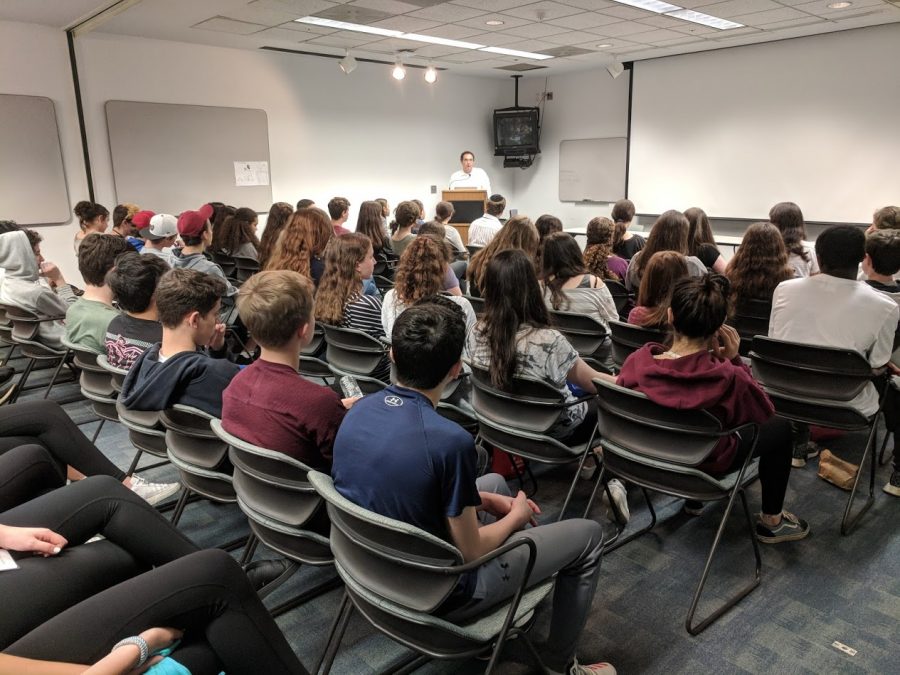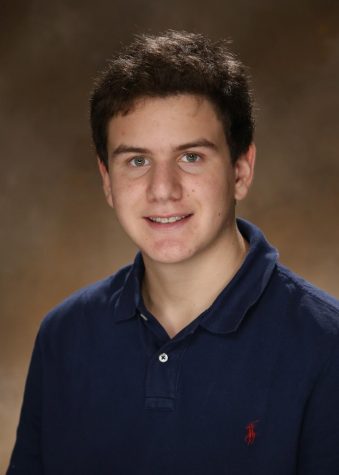Freshman class discusses ethical dilemmas in NIH trip
photo courtesy of Aileen Goldstein
Bioethicist Dr. Ben Berkman presents different ethical scenarios that he has faced to freshman during the field trip to the NIH on Wednesday to learn about the ethics of different genetic procedures. “Bioethics are important to biology and genetics (and all of science really) because technological advances can profoundly impact societies in good and bad ways, and it is important to proactively think through how we want a technology to change society,” Dr. Berkman said. Bioethicists act as researchers, consultants and teachers.
May 18, 2018
On May 16, the freshman class went on a field trip to the National Institute of Health to learn about bioethics. The trip was jointly planned by biology teacher Kelly Grosskurth and Ethical Dilemmas teacher Paul Blank.
Grosskurth credited Blank with coming up with the idea for the field trip.
“[Blank] had this idea or thoughts of this idea of a potential field trip based [on the] ninth grade curriculum which involves a lot of genetics, and a lot of that is what has to do with the Ethical Dilemmas class,” Grosskurth said.
During classes leading up to the trip, students learned about different genetic diseases, in-vitro fertilization, prenatal testing, abortion and the causes of genetic mutations so that they were prepared.
To kick off the trip, bioethicist Dr. Ben Berkman presented students with a series of case studies of different situations where modern genetic science caused problems in real world situations, asking students their own opinions.
Freshman Jacob Svoysky appreciated that students were encouraged to think through and share their thoughts on various ethical dilemmas.
“You can’t really be a biologist without knowing or thinking about the consequences of the experiments that you’re going to do and what you tell people about biology,” Svoysky said.
Afterwards, Dr. Berkman, local rabbi Adam Raskin and genetic counselor Lori Erby held a panel to discuss their roles in the decision making process around IVF and prenatal testing.
Although IVF was a hotly-debated topic years ago, it is no longer as relevant as it once was, and Berkman said it “hasn’t really been a big focus in his career.
Students were then taught how the gene editing program CRISPR works, drawing on information learned recently in their biology classes. They also discussed the ethics behind certain uses of the program, such as making “designer babies” in the future.
The field trip also had a tour component, and the students split off into different groups to learn about either zebrafish, nematodes or Parkinson’s disease. Students could also tour the Clinical Research Center, learn about different topics such as healthy food choices in virtual reality, visit the Jewish Bikur Cholim of Greater Washington House or go on a scavenger hunt.
About three months of planning went into the trip, and Grosskurth hopes to run the trip in future years due to its success.
“I think, at some point we’ll have kind of a debriefing with all of the teachers that were on the trip to just get feedback and info … to see how we can improve it for next years,” Grosskurth said.
Though Berkman felt that smaller groups might have helped with the discussion of certain genetic ethical dilemmas instead of the full grade, he said that students were invested in the activity.
“I thought that the students were really engaged in the bioethics case discussion and I really appreciated their enthusiasm and thoughtfulness in responding to the scenarios I presented,” Berkman said.








